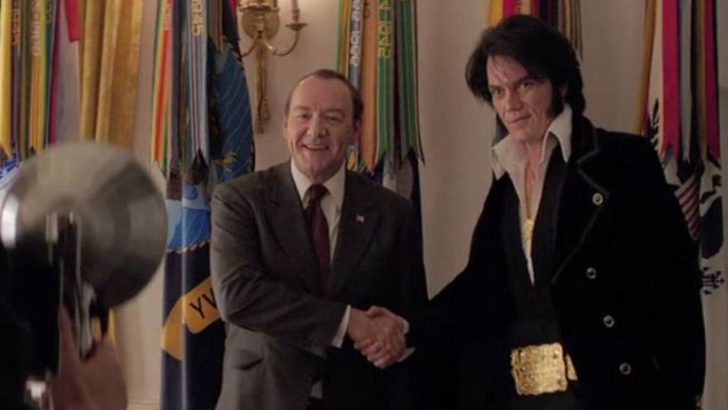Elvis and Nixon (PG)
When Elvis Presley met Richard Nixon in the Oval Office of the White House a few days before Christmas in 1970, he was in a pretty bad state. He’d had an argument with his father shortly beforehand and stormed out of his mansion, Graceland, in a temper.
He hadn’t a cent in his pocket (Elvis never carried money on him) but he still managed to travel from Memphis to Washington D.C., book into a hotel and write a letter to Nixon (on hotel stationery) pledging his allegiance to the president’s anti-drug policies.
The fact that Elvis, as we now know, was a drug addict himself, made the situation somewhat weird. (He was addicted to prescription drugs which, to his mind, weren’t ‘really’ drugs – but of course they were.)
When he shook hands with Nixon, the story goes, Nixon said to him, “You dress kind of strange, don’t you, young man?” To which Elvis replied, “You got your show to run, Mr President, and I got mine.”
Their historic encounter has now been captured in a movie starring Kevin Spacey as Nixon and Michael Shannon as Elvis. Shannon looks about as much like Elvis as I do. Spacey looks like, well, like Kevin Spacey.
In a world in which there are almost as many Elvis impersonators as there are Elvis gold records, could they not have found someone who more closely resembled the man himself? Spacey is also hard to ‘buy’ as Nixon because he’s such a recognisable face. But both actors perform very well under the circumstances.
The encounter between them is the ‘meat’ of the film. (Subsidiary material concerning Elvis’ ‘Memphis Mafia’ sidekick Jerry Schilling is boring by contrast.)
In the course of it, Elvis managed to wheedle a Drug Enforcement badge from Nixon. When I was a member of Elvis’ Fan Club in the 1990s I was informed Elvis was possibly ‘high’ on barbiturates when he asked Nixon if he could be one of his undercover narcotics agents. Ironic or what?
It’s a pity such irony wasn’t picked up on by the film’s director, Liza Johnson, but she does give us other treats, like Elvis being mistaken for one of his impersonators at one point.
Why did Elvis want the meeting at all? Was it a kind of Freudian sublimation of his own predilections? As for Nixon – whose Watergate shame was a few years away – it was probably nothing more than an attempt to snare the youth vote. (This was hardly likely to happen to such an inordinately uncool man.)
The film would have worked better as a Pythonesque satire rather than Johnson’s semi-historical take on a rendezvous between a lovable redneck who had a passion for karate and doughnuts and a ‘square’ who didn’t know rock ‘n’ roll from a hole in the ground.
What they did share in common was an antipathy towards hippies and communists. With Elvis, sadly, the rebelliousness ended with the music.
Good ***


 Aubrey Malone
Aubrey Malone Kevin Spacey (left) and Michael Shannon star in Elvis and Nixon.
Kevin Spacey (left) and Michael Shannon star in Elvis and Nixon. 